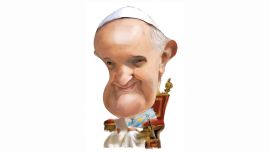The widespread rights abuses committed against protesters in Venezuela has left democracy “barely alive,” the United Nations declared this week, just hours after a diplomatic war of words erupted after France branded the government in Caracas a “dictatorship.”
A fresh UN report warned that the rights situation in Venezuela was at “grave risk” of unravelling further as the authorities continue to brutally repress demonstrators, and urged international action.
Recent actions by Venezuela’s authorities “support the feeling that what is left of democratic life in Venezuela is being squeezed,” UN human rights chief Zeid Ra’ad Al Hussein told reporters in Geneva, where the report was launched.
Democracy in Venezuela “must be barely alive, if still alive,” Zeid said.
The UN representative did not go as far as French President Emmanuel Macron, who on Tuesday accused his Venezuelan counterpart Nicolás Maduro of creating a “dictatorship ... at an unprecedented humanitarian cost,” in one of the harshest condemnations yet of the Latin American regime by a European leader.
Caracas hit back against Macron, with the Foreign Ministry expressing “firm rejection of the deplorable comments” by the French leader.
“They constitute clear interference in the internal affairs” of Venezuela, it said in a statement.
‘Crush dissent’. The UN report accused Venezuelan authorities of implementing a policy of repression to crack down on months of street protests against Maduro.
“The generalised and systematic use of excessive force during demonstrations and the arbitrary detention of protesters and perceived political opponents indicate that these were not the illegal or rogue acts of isolated officials,” it said.
The extent of violations “in our view point to the existence of a policy to crush dissent and instil fear in the population with the intention of curbing these demonstrations,” one of the report authors, Herman Vales, told reporters.
Venezuela, which is suffering from an acute economic crisis marked by shortages of basic goods, has experienced months of deadly street demonstrations against Maduro that have left 125 people dead, according to prosecutors.
Wednesday’s report found that security forces and progovernment groups were responsible for at least 73 of the protester deaths. It remained unclear who was behind the remaining deaths, the rights office said.
Zeid also pointed out that his office had documented “serious violations of due process and patterns of ill-treatment, in some cases amounting to torture.” The tactics listed in the report included “the use of electric shocks, severe beatings, stress positions, suffocation, and threats of sexual violence and death.”
After receiving no response to repeated requests for access to Venezuela to investigate the situation, Zeid deployed a team of human rights officers to monitor the country remotely.
The investigators conducted 135 interviews between June 6 and July 31 with victims and their families, witnesses, civil society organisations, journalists, lawyers and doctors, among others.
More than 5,300 people have been detained in Venezuela since April 1, with more than 800 still held, the report authors said, adding that more than 700 detained civilians had had their cases handled in the military justice system. It also pointed to repeated attacks on journalists and media workers that “appeared to be intended to prevent them from covering protests.”
‘Extremeley serious’. While acknowledging that the number of demonstrations, detentions and deaths had decreased in recent weeks, Zeid expressed concern at efforts to criminalise Venezuela’s political opposition.
The country’s all-powerful new Constituent Assembly announced this week it would hold treason trials for opposition leaders it said are promoting economic sanctions imposed by the United States.
Wednesday’s report called on the UN Human Rights Council to “consider taking measures to prevent further deterioration of the human rights situation” in Venezuela, which currently holds a seat on the council.
Meanwhile, Venezuela’s chief prosecutor has launched embezzlement accusations against his predecessor, who fled the country saying the government wanted to kill her after she challenged it over a deadly political crisis.
Former chief prosecutor Luisa Ortega is currently in Mexico, the latest stop on a tour of countries where she has been denouncing alleged corruption by Venezuelan President Nicolas Maduro. He has branded her a corrupt and a traitor. She says she is being persecuted after becoming Maduro’s most prominent domestic critic and has even accused the government of hiring contract killers to go after her.
Ortega’s pro-government successor Tarek William Saab told a press conference Thursday he was investigating the embezzlement of US$200 million skimmed off from inflated state oil contracts between 2010 and 2016. William Saab accused Ortega of turning a blind eye to the fraud and failing to investigate it when she was chief prosecutor.


























Comments